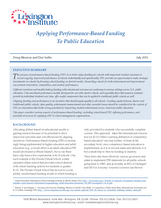Executive Summary
The purpose of performance-based funding (PBF) is to better align funding for schools with important student outcomes to incent ongoing, improved performance of schools individually and systemically. PBF provides an opportunity to make strategic investments in schools by focusing school funding on desired results. Rewarding schools for both achievement and improvement can promote innovation, competition, and student performance.
Different variations and models linking funding with educational outcomes are underway in various settings across U.S. public education. Outcome-based performance models developed for use with charter schools, and especially those that measure academic growth by individual students over time, offer useful components that can be applied to traditional public schools as well.
Aligning funding and performance is an incentive that should apply equally to all schools. Funding equity between charter and traditional public schools, data quality, achievement measurement and other essential issues should be considered in the context of PBF, an innovation that holds strong potential for improving student achievement across American public education.
This paper considers various aspects of performance-based funding, including school based PBF, defining performance, and potential structures for applying PBF to school management organizations.
Click here to download the full study as PDF.
Find Archived Articles:
